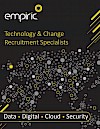How RPA is Transforming Business



The broadest definition of Artificial Intelligence describes systems that can handle tasks that previously required human intelligence to be completed. This extends all the way up to self-aware general artificial intelligence, but at the other end of the scale is Robot Process Automation (RPA).
While this might be a primitive form of AI, it has enormous potential – and can help businesses to accelerate their processes at the same time as cutting costs. Hadoop forecasts that by 2025, RPA will drive savings of at least $5 trillion for businesses while replicating the work of 140 million full-time workers.
An estimated 10% to 20% of all working hours are spent on repetitive, computer-based tasks while 30% of IT departments’ workloads are spent on simple, basic tasks. Automation means that these hours of work can be replicated in a fraction of a second and at close to zero cost freeing up valuable time. These benefits are broadly applicable across the board – whether in the supply chain, accountancy, government or ecommerce.
RPA ensures that data is reproduced accurately. In the medical field this is absolutely critical, as mistakes have the potential to cause significant harm. Beyond this, RPA can assist the healthcare sector with tasks ranging from managing appointments and hospital assets to handling admin – and has the potential to generate savings of anywhere from 20% to 50% in certain processes. This frees up medical staff from having to deal with the chore of filling in paperwork and instead allows them to focus their attention on patients and patient care.
Meanwhile, close to 100% of respondents in financial services polled by PwC said that RPA was important to their firms – while more than one in ten said that making advances in this and similar fields was a matter of life and death for their companies.
While healthcare will likely use RPA to redirect staff towards more productive activities, the same opportunities are not necessarily available in financial services – resulting in the need for streamlining, which will require careful organisational management.


RPA is best applied to frequently performed and highly repetitive tasks, where a simple rule can be set, saving a worker from having to manually intervene.
While IT outsourcing might achieve some of the same goals (having relatively low paid workers complete data entry tasks, for example), RPA has generally been found to be far more effective – and it has a far wider range of applications. RPA is also inherently highly scalable, so it can perform a task thousands of time just as easily as doing it once, while working 24/7. The fact that information never needs to leave the system also makes it a more secure option than bringing in third parties.
Unlike more complex AI and machine learning solutions, RPA is also relatively simple to deploy (and it comes with no need to process extensive training data before going live). Additionally, it’s a technology that can be deployed on a case-by-case basis across the business – allowing the company to experiment and to find new applications over time, without necessarily needing to commit to a business-wide development project (though doing so will likely unlock far greater benefits and will do so much more rapidly).
It’s also advisable to have specialists such as Enterprise Architects, RPA Analysts, RPA Developers and Program Managers on hand to oversee setup, management and maintenance – and you will likely need a dedicated team to manage the technology. After all, if an automated process malfunctions, or is based on a flawed premise, then it can quickly become a major headache. As Bill Gates said, “Automation applied to an efficient operation will magnify the efficiency… Automation applied to an inefficient operation will magnify the inefficiency.”
RPA can also act as a stepping stone to more complex AI applications, and act as a crucial element in a larger digital transformation programme. Intelligent Process Automation (IPA), for example, is a more developed approach that improves itself with practice and is able to make decisions, rather than merely following set rules.
Deploying RPA effectively will require considered process analysis, careful planning and thoughtful selection of technology platforms and partners. However, the investment is likely to pay for itself many times over, making the business far more efficient and far more agile and enabling staff to be considerably more productive. The technology is now becoming increasingly ubiquitous – and organisations that don’t explore the potential of RPA may well find themselves at a significant disadvantage relative to their competitors.

Empiric is a multi-award winning business and one of the fastest growing technology and transformation recruitment agency's specialising in data, digital, cloud and security. We supply technology and change recruitment services to businesses looking for both contract and permanent professionals.

Read more (pdf download)
Empiric are committed to changing the gender and diversity imbalance within the technology sector. In addition to Next Tech Girls we proactively target skilled professionals from minority groups which in turn can help you meet your own diversity commitments. Our active investment within the tech community allows us to engage with specific talent pools and deliver a short list of relevant and diverse candidates.
For more information contact 02036757777 To view our latest job opportunities click here.